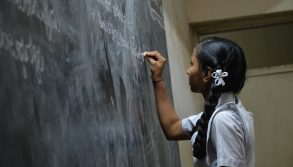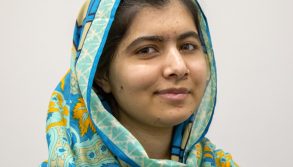Educating Africa’s girls
5 June 2019
Sunday, 16 June is the International Day of the African Child — a joint initiative of the African Union (AU) and African Committee of Experts on the Rights & Welfare of the Child (ACERWC). This annual event seeks to raise awareness of the continuing need to improve educational opportunity for Africa’s children.
Describing the day itself, the AU & ACERWC argue: “The Day [of the African Child] should not be celebrated […] as an event but rather as a process,” that builds on previous progress towards the “realisation of the rights of children.”
Africa is the youngest Continent on earth
For Africa especially, ‘the youngest Continent on earth’, it’s youth will determine its future prosperity. By 2050, the Continent will account for 42 per cent of all births and 40 per cent of everyone alive on earth aged 18-years or younger.
To truly capitalise on this ‘demographic dividend’, African governments must be supported to practically realise Article 11 of the African Charter on the Rights and Welfare of the Child (‘the Charter’) which guarantees every child an education — girl or boy. The right to a good education is advocated by many, but practically supported by very few.
Within Article 11.3.(e). is of particular interest, dealing as it does with equal access to education for disadvantaged children, with reference to girls in particular. Sadly, for many girls in Africa the reality is that they become ‘children having children’. This issue is cyclical, partially being a cause, and a consequence of, a lack of education.
Education of pregnant girls
Africa has one of the highest rates of adolescent pregnancy anywhere in world (UNICEF: 2018). “In many African countries, pregnant girls and adolescent mothers are forced out of school and denied their right to education,” says Human Rights Watch.
Governments in Africa then must do more to keep pregnant girls in school or facilitate their return to education as young mothers. While many countries do not actively support pregnant girls in school, three countries — Equatorial Guinea, Sierra Leone, and Tanzania — still actively ban pregnant girls and young mothers from public schools; with Tanzania even arresting pregnant girls. Tanzanian President, John Magufuli is on record as endorsing the 1961 law which bans pregnant girls from school, describing them as “immoral”. In a similar vein, countries like Morocco and Sudan have been known to make use of ‘morality laws’ to charge pregnant girls with adultery, indecency or extra-marital sex.
In addition to those three countries outlined above which use legal measures against pregnant girls and young mothers, a further 23 African countries lack clear policies. The overwhelming consensus is indicative of a belief that education is as a privilege that can be withdrawn rather than a right which must be exercised. Further to those legal responses outlined above are social and cultural attitudes in countries such as Senegal and Malawi that can make it harder than necessary for young mothers to return to school by requiring medical certification or letters from various education officials.
A Liberian case study of teenage pregnancy
Liberian Jestina Barleah fell pregnant aged 14 and it was assumed that she would drop out of school — very common in Liberia, where girls are forced to leave education because of shame or as a ‘warning’ to other girls. Luckily, Jestina went to a school supported by Bridge Liberia, which has a clear policy against expelling teenage mothers.
There is evidence that attitudes are changing towards educating girls in Liberia, with former education minister George Werner acknowledging that: “Traditionally, girls did not have the same choices as boys.”
Werner credits national and international campaigns as playing a part in influencing Liberian attitudes but places a far higher significance on the election of Africa’s first female head of state, Ellen Johnson-Sirleaf, who was President of Liberia from 2006–2018. Enabling children like Lucia Toe, to dream of becoming President’s themselves.
Young African girls then would clearly also benefit from better representation at the highest levels of African governments; a journey that almost certainly starts with completing their education.
Education of young mothers
Presently less than half of all African Union countries have laws, politics or strategies in place to guarantee girls’ right to education when they are pregnant or when they become mothers. Some of those that do have policies include things such as:
- A choice of morning or evening school, as in Zambia;
- Establishing nurseries near to schools, as in Gabon;
- Access to sex education and contraceptives and legal, safe abortions, as in Ivory Coast and South Africa respectively;
- Providing special accommodation for mothers, times for breastfeeding and time off to look after sick children, as in Cape Verde; and,
- Many more.
The many benefits of educated mothers
Ultimately, throwing pregnant girls out of school, or making it difficult for child mothers to return to the classroom are regressive policies that will do little do fulfil the right of every child to education or enhance the prosperity of communities and nations.
The benefits of enabling girls to continue their schooling, despite pregnancy or motherhood, are too numerous to mention but two facts bear special consideration — testament to the multiplier effect of education:
- An educated mother is less likely to die in childbirth, live in poverty, contract HIV/AIDS and get married as a child and more likely to give birth later in life, earn more money and invest in her family; and,
- The children of an educated mother are more likely to live longer and healthier lives.
It is a struggle enough to access quality education as a girl in many low and middle-income countries, compounding this struggle with the challenges of pregnancy and motherhood can make it almost impossible for many. At Bridge we encourage girls that are pregnant to remain in school and actively try and persuade young mothers in our communities to return to the classroom.
If you believe every girl deserves the right to education, join us this Day of the African Child in calling for a clear commitment to keeping pregnant girls in school and helping young mothers to return to the classroom.
Copy and paste the message below or CLICK HERE to share this blog on Twitter, or write your own message and include the link http://bit.ly/319LHxD and #DAC2019
This #DAC2019 the @_AfricanUnion & @ACERWC must re-commit to ensuring all children, including pregnant girls and young mothers in #Africa have access to #education http://bit.ly/319LHxD via @BridgeIntlAcads









